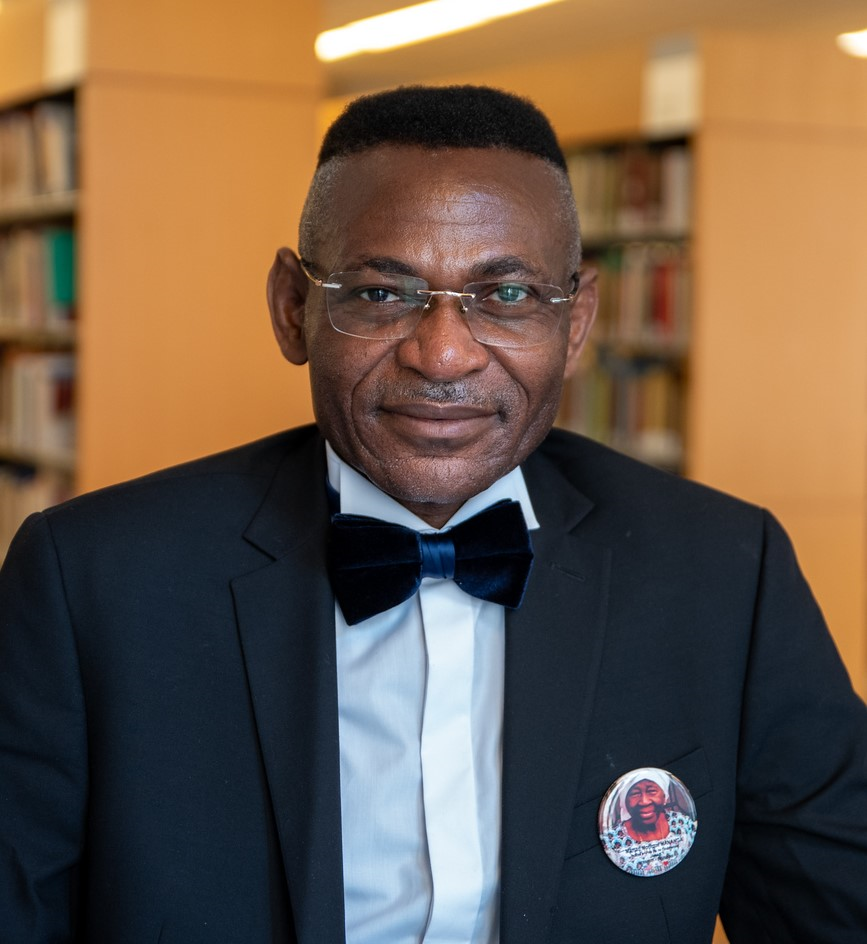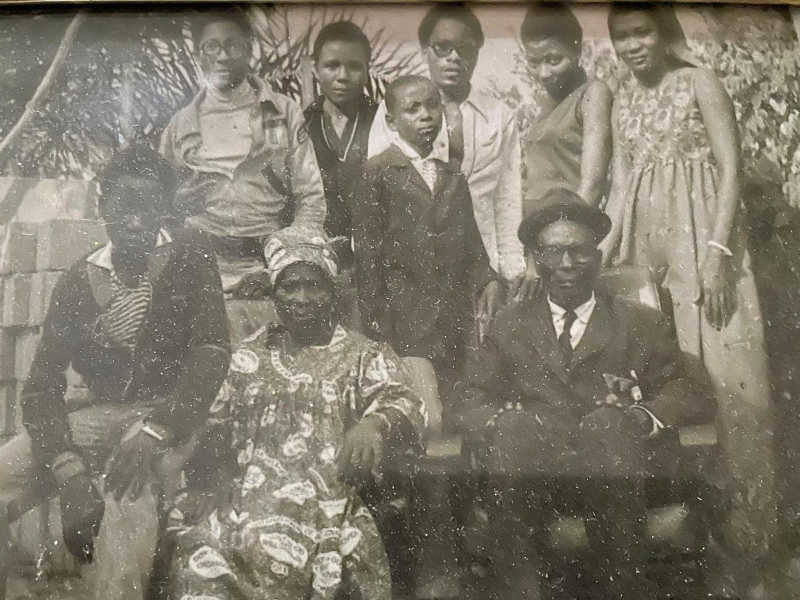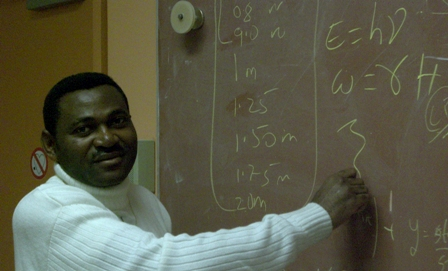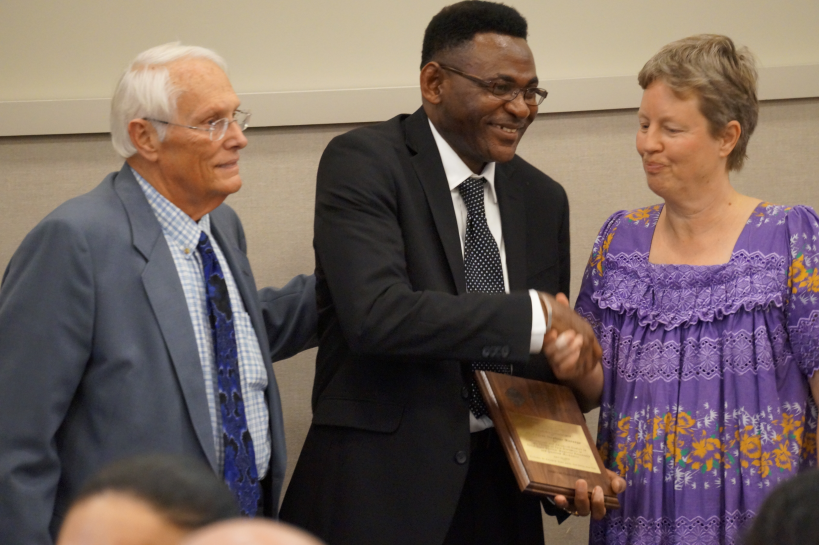The Immeasurable Impact of an Effective Mentor
Eugene Mananga, PhD, a professor of physics and chemistry at the City University of New York (CUNY), recently received the prestigious Presidential Award for Excellence in Science, Mathematics and Engineering Mentoring.
Published May 2, 2025
By Nick Fetty

When Professor Eugene Mananga, who is also a member of The New York Academy of Sciences (the Academy), got the news that he would receive this prestigious award, he admits he never even contemplated he could earn such an honor.
“It was astonishing and extremely impressive to have the value of my STEM mentoring be considered at the highest level,” he said. “My life has been full of directions I never could have imagined.”
The Value of Education and Hard Work
Eugene Mananga’s life story began in the Central African nation of Cameroon. He was the youngest of eight children in a middle-class family. His mother was forced to abandon her educational journey in third grade (the highest level of education offered to girls at that time) while his father didn’t make it past elementary school. Despite these limitations, his parents instilled in him the value of education and hard work.
Prof. Mananga excelled in his math classes in elementary and high school. He also developed an interest in physics and had an appreciation for the work of early classic physicists like Isaac Newton. “At an early age, I found physics more real as it is concerned with all aspects of nature on both the macroscopic and submicroscopic levels compared to mathematics that I would say instead is a language of physics,” he said.
As an undergraduate at the University of Yaounde in his home country, he majored in physics with a minor in chemistry and went on to graduate in the top five percent of his class. He remained at the university to earn his MS in physics and a diploma of advanced studies (DEA) in physics, securing first rank and becoming one of the youngest students in Africa ever to earn a DEA in physics. Prof. Mananga was the first in his family to graduate from high school and from college.
“This unique opportunity brought pride to my family and a heavy sense of responsibility on my part,” he said in reflection.
Next, he pursued a doctorate in mechanics degree in theory of solitons at Yaounde, though he did not defend his thesis. Instead, he decided to attend a university in France (his first language is French) or the United States in order to achieve his career aspirations.
Coming to America

Prof. Mananga arrived in New York City in 1999. In the next six years he would earn an MA in physics from the City College of New York, as well as an MPhil and PhD, both in physics from the City University of New York’s (CUNY) Graduate Center. His doctoral research, advised by Steve Greenbaum, PhD, focused on condensed matter physics and materials science. This work led to the first report on the effect of high pressure on self-diffusion in a membrane. The report was impactful because it illustrates how the pressure dependence of self-diffusion coefficients can be a useful tool in characterizing molecular motion in fuel cell membranes, batteries, and energy storage–areas of deep importance to sustainability.
He then pursued a series of postdoctoral positions that took him from the U.S. National High Magnetic Field Laboratory and the French Alternative Energies and Atomic Energy Commission to Harvard Medical School and Massachusetts General Hospital. Once appointed to a joint assistant professorship with Bronx Community College and the CUNY Graduate Center, he made it a goal to get tenured as fast as possible.
“To the best of my knowledge, I am the first and only faculty member from the CUNY system who was promoted from associate professor to full professor in a one-year time period,” he said, adding that tenure now enables him to place more emphasis on mentoring and research.
In addition to his CUNY faculty appointments, Prof. Mananga is an adjunct professor of applied physics at New York University, a selected fellow at the KAVLI Institute for Theoretical Physics at the University of California Santa Barbara, and has received highly selective visiting faculty fellowships from the U.S. Department of Energy to mentor students and to conduct research at major US national laboratory such as Brookhaven National Laboratory, Argonne National Laboratory, and Lawrence Berkeley National Laboratory.
Impactful Research
Prof. Mananga’s research spans a range of topics in condensed matter physics, materials science, computational chemistry, and, to a lesser extent, nuclear medicine. His most recent research has involved controlling the spin dynamics in solid-state nuclear magnetic resonance (NMR) and using computational methods based on density functional theory (DFT) to characterize materials systems in zeolites, catalysts, fuel cells, batteries, and energy storage. He believes these areas are critical to sustainability. His work utilizes a range of methods, from experimental solid-state NMR to theoretical chemical physics and spectroscopy to modern computational chemical science with high-performance computing.

“I am best known for my work on the Floquet-Magnus expansion, a mathematical technique widely applied in NMR spectroscopy, condensed matter physics, and applied mathematics,” he said.
His key contributions are in three areas:
- In Solid-state NMR spectroscopy, where alongside Thibault Charpentier, PhD, during his stint at the French Alternative Energies and Atomic Energy Commission, the duo introduced the Floquet-Magnus expansion in solid-state NMR. Furthermore, their work in spin dynamics has contributed to the study of high resolution in solid-state NMR.
- In quantum physics and magnonics, where his work on the Floquet-Magnus expansion theory and applications could be extended, enabling new applications in quantum mechanics and spintronics.
- In medical imaging and nuclear medicine, where his postdoctoral research at Harvard Medical School and Massachusetts General Hospital has contributed to the detectability of a myocardial defect in a cardiac PET study to investigate better diagnostic imaging techniques in nuclear medicine.
To date, Prof. Mananga has more than 80 peer-reviewed scientific articles to his name. He’s also received a handful of prestigious research awards including the 2024 Distinguished Mentor Award from the Society for Advancement of Chicanos/Hispanics and Native Americans in Science (SACNAS), and the 2018 Distinguished Scientist Award from the American Chemical Society (New York Section).
The Impact of Mentors

From his parents and siblings to his professors and colleagues, Prof. Mananga is quick to attribute strong mentors as playing a significant role in his success.
“Accepting this highest honor without acknowledging those who have mentored and educated me since my childhood would be ungrateful,” he said of receiving the Presidential Award for Excellence in Science, Mathematics and Engineering Mentoring. “My work could not have been possible without the assistance of numerous colleagues and the mentees I have mentored.”
Prof. Mananga offers various tips that he thinks are the keys to effective mentoring:
- Failure should be seen as a learning opportunity for development. Don’t be afraid to make mistakes.
- The most important qualities that other mentors can help students and mentees develop for effectively engaging and impacting them are: creativity, judgment, communication, organization, and persistence.
- Encourage mentees to ask questions, and even to challenge the mentor when applicable.
- Engage and provide opportunities for students from underrepresented backgrounds.
- Be willing to embrace change.
“I believe that mentoring prowess is similar to scientific knowledge that builds on others’ work, and that discovering truth is a result of combining past discoveries,” said Prof. Mananga. “Isaac Newton once wrote that if he had seen further than others, it was because he stood on the shoulders of giants.”
Appreciation for Sports, Music, and Dancing
Just as much as his life and career have been widely varied, so are his hobbies and interests outside of work. He’s a supporter of the Cameroon national soccer team and is proud to point out that the team “holds the record as the first African country ever to reach the quarter final in the World Cup in 1990.” A fan of boxing, he enjoys rewatching the famous 1974 heavyweight championship bout between George Foreman and Muhammad Ali. Dubbed “The Rumble in the Jungle,” the fight took place in what is now the Democratic Republic of the Congo.
He also enjoys music, listening to everything from classical composers like Beethoven and Mozart, to popular artists like Otis Redding, Bob Marley, Beyoncé, and Rihanna. He even dances.
“They might not want to admit it, but my daughters can testify that I am a good dancer of early style Assiko music from artists like Jean Bikoko Aladin to the modern style of Olivier de Clovis and Belka Tobis,” he said with a laugh.
In reflection of his life that was “full of directions [he] never could have imagined,” Prof. Mananga cannot overstate the importance of impactful mentors for a productive career and a fulfilling life.
“As a mentor, one of the most valuable things you can do is to pay attention, do the right things, and help others without forecasting anything in return,” he said. “By taking positive steps, mentors are telling mentees that they can excel. Everything we do helps build the next generation.”
Are you interested in being an impactful mentor like Professor Eugene Mananga? Check out mentoring opportunities available at the Academy.
